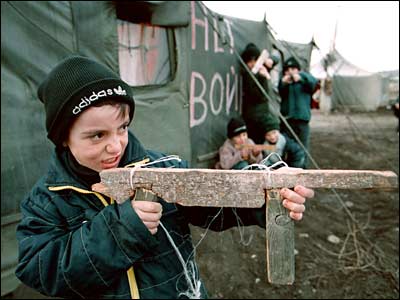
One of the best sources of information about Russia’s troubles with its breakaway provinces of Chechnya and Igushetia is the Prague Watchdog website. You know they’re doing their job because they routinely come under cyber attack from Kremlin-friendly terrorists, and the website often crashes. Cyber warfare is another arrow in the Kremlin’s malignant quiver of dictatorship that it hasn’t hesitated to deploy at will, most infamously against the nation of Estonia when they dared to move a monument to Russian soldiers installed by Soviet imperialists.
Two recent articles from PW are cases in point.
First, in regard to Chechnya, PW reports:
The Chechen underground, it seems, has got its second wind. The beginning of the spring and summer campaign has been marked by several high-profile attacks. However, in the absence of any plausible statistics it is rather difficult to judge to what extent the current activity of the saboteurs is unique. Does it exceed the figures for the same period last year, or the year before? While it would obviously be wrong to jump to conclusions, the frequency and scale of operations during the past month are none the less unprecedented. The Alkhazurovo raid in May, the similar attacks in Benoy, the shelling of a convoy near the village of Chishki, the shooting-up of an armoured personnel carrier near Bamut: such is the list – doubtless an incomplete one – of sabotage actions by the Chechen underground.
I routinely report instances of separatist violence in Chechnya on my blog La Russophobe, and I have pointed out how utterly insane it is for Russia to be allowed to hold the 2014 Olympic games in nearby Chechnya. This is quite simply an open invitation to terrorism on a massive scale that Russia can do nothing to prevent. In fact, there’s a huge question as to whether Russia can even manage to build the facilities it needs to actually host the athletic contests, much less to provide security.
But this has no effect on the Kremlin’s propaganda machine, which continues to insist it has solved the Chechnya problem. The Kremlin has liquidated all opposition parties in Russia and destroyed the independent media. All national TV stations are state-owned and dispense no criticism of the Kremlin — contrast this with the relentless bashing George Bush gets over Iraq.
Then PW came with a second item, this time about Ingushetia, ominously warning:
For the sake of dramatic effect it could be said, as some experts have done, that Ingushetia is now on the brink, and that on the other side lie open disobedience and disloyalty to the federal centre, armed struggle running parallel with civic protests which are assuming an increasingly ambitious and large-scale form, Salafism, Wahhabism, and so on. All of these factors are already present, and the dynamic they create as they grow is an explosive one. Yet it is premature to draw the conclusion that events in Ingushetia will inevitably follow the Chechen pattern.
The depth of Ingushetia’s loyalty to the federal centre, something for which the republic has always been famed, is rather difficult to measure. But neither the Ossetian-Ingush conflict, during which Moscow, in the opinion of the Ingush, provided exclusive and disproportionate armed support to the Ossetian side, nor the Chechen wars, which passed like a fiery, inhuman mangle across the territory of fraternal Chechnya, were able to shake the foundations of the Ingush people’s civic identity. Most Ingush continued to see themselves as citizens of Russia and did not even think about the possibility of living a separate existence, despite the fact that the Chechens had been trying to draw Ingushetia into its separatist project ever since the days of Dudayev.
Today the situation has radically changed. Magomed Yevloyev, owner of the “Ingushetiya.ru” website, says: “In Karabulak there is an old man who keeps a watchful eye on people’s moods – especially the moods of the young. On public transport and in the streets he listens carefully to what people are saying. He recently told me: ‘We’ve lost Ingushetia. Young Ingush have a very narrow field of ideas. On the buses and minibuses the only conversations you hear are about guerrillas, emirs, the Emirate, where road-mines were laid, where federal troops came under fire, where police were killed. The armed underground is an example to be emulated, and armed struggle is now seen not merely as something normal, but as a necessity. To die in battle means to fulfil the lofty destiny of a man, a warrior and a Muslim.’”
If you read the entirety of the two reports, you can’t escape the conclusion that the situation in these breakaway provinces is not only not solved but about to explode. Combine that with the powder keg atmosphere Russia has insanely created in Georgia, where is it giving direct military aid to that country’s breakaway province of Abkhazia, and you have a truly toxic scenario. If Russia can aid Georgian rebels, why can’t radical Islamacists aid their comrades in Chechnya and Ingushetia? Russia has lost any moral authority it might have had, and is losing the battle on the ground as well. It has been condemned by virtually every major human rights organization on the planet for its barbaric atrocities against the civilian population in Chechnya, and it has been convicted of state-sponsored murder in the European Court for Human Rights.
But the people of Russia remain blithely ignorant and apathetic, just as was the case in Soviet times.



